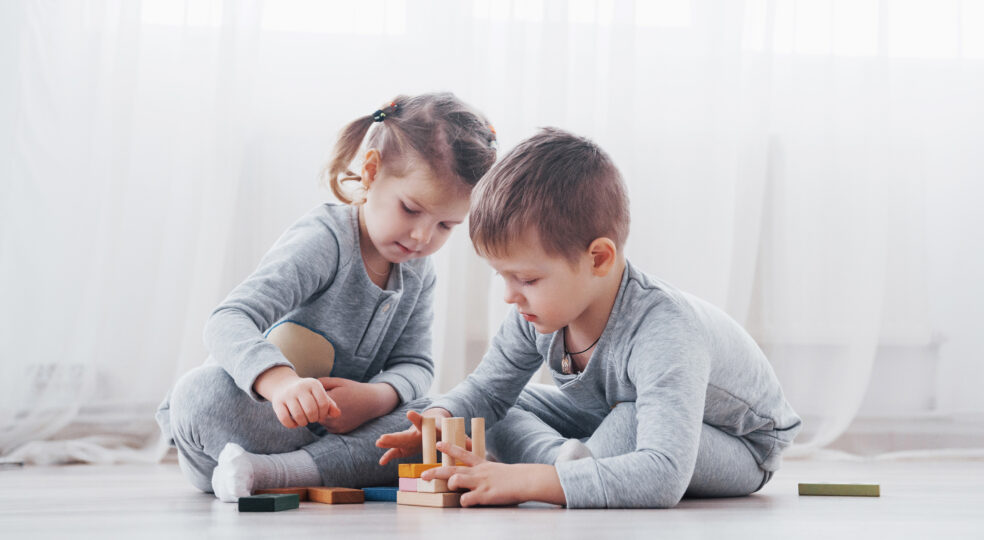
In developmental psychology, cognitive development is of particular importance. Put simply, it is the attainment of mental maturity that distinguishes adults from children. The process extends over several years and is not necessarily completed even in early adulthood.
The Swiss psychologist Jean Piaget as well as the Soviet psychologist Lev Semyonovich Vygotsky have decisively influenced current research in this field. Their theories are still used today. In the following, you will learn about the steps of cognitive development and how you can specifically support your child.
Cognitive development refers to an expansion of knowledge and perception, as well as a change in the cognitive processes leading to them. It is an important aspect of the general development from child to adult. Sometimes it is also referred to as spiritual or intellectual development the speech.
As part of this process, the central abilities of the human brain are formed. This includes, for example, differentiating between people and facts. Impulse control also plays an important role. Furthermore, the following abilities belong to the cognitive functions:
If cognitive development is impaired, the affected adults often stand out due to "immature" behavior.
Cognitive abilities cover a wide spectrum. Every child develops them step by step in order to become more and more proficient in an independent everyday life. Let's take a look at some examples below:
There are disputes within the family. A cognitively well-developed child is capable of looking for solutions. Let's assume that the topic of the argument was the family meal plan, because the child wants to eat vegetarian in the future. It offers to buy the appropriate food and to select it in such a way that there is no additional effort in the preparation.
The child feels that he has been graded unfairly at school. He seeks a discussion with his teacher and presents his arguments in a factual manner. Ideally, he/she can even prove why a better grade would be appropriate (e.g. only half a point difference to the next better grade, excellent oral performance, discretionary leeway, etc.).
The child wants to travel with his parents over the weekend, but he has a lot of homework to do. In addition, an important test will be written on Monday. So the child has to organize his or her work and study load accordingly so that he or she can manage everything despite the trip. This requires smart planning.

Jean Piaget was a renowned psychology professor with an impressive CV. He discovered his interest in natural sciences and psychology at an early age. As a professor, he worked at numerous renowned universities. Until his death in 1980, he directed the "Centre International d'Epistémologie Génétique", which he founded.
In order to understand the theory of cognitive development according to Jean Piaget, it is useful to familiarize oneself with the most important basic concepts in advance:
Adaptation is the ability of a child to adapt to its current environment according to its developmental stage. Accordingly, adaptation occurs more frequently in the course of child development. These phases are particularly pronounced in infancy and during puberty.
Assimilation refers to the active modification of the environment by the child.
Accommodation describes the modified adaptation of the child to his environment.
Equilibration is synonymous with the ability to self-regulate. It drives all child development processes. With the help of equilibration, the child learns to coordinate himself internally and to view the structures of his everyday life in a differentiated way.
Now that you are familiar with the most important technical terms, let's relate them to each other: All the development steps mentioned build on each other.
The ability to adapt to the environment forms the basis of cognitive development. This step can be divided into two processes: In the first step, new information is inserted into already known schemata (assimilation).
Example: A child loves stuffed animals. Now he gets a pet as a gift and treats it just as lovingly and caringly.
Sometimes, however, new information cannot be classified into known schemata. In this case, the child must learn a new schema. This is called accommodation.
This interplay repeats itself at regular intervals in the course of the child's development. Depending on the developmental phase the child is currently in, sensory, operatoric or conceptual schemata form the basis of this Learning process. Put simply, assimilation and accommodation form the basis of adaptation.
In the context of the explanation of terms, we have already briefly discussed the importance of equilibration. Now we would like to take a closer look at this important building block of child development:
As mentioned earlier, a child's cognitive development should be viewed as an interplay between states of equilibrium and states of disequilibrium. By learning to rebalance through experience, the child reaches the next higher level of cognitive development. This is called the equilibration principle.

According to Jean Piaget, cognitive development includes the following four stages:
Let's look at the four stages in detail below:
In the sensorimotor stage, which extends from infancy to toddlerhood, the child explores his or her environment through perception and movement. The sensorimotor stage comprises six stages:
Interesting to know: Even after the second year of life, sensorimotor development is not completely finished. However, it is then no longer quite so decisive for mental development.
The preoperative stage is characterized by the use of mental representations in the form of words, images and gestures. The Children are gradually learning to think in signs and symbols. Nevertheless, it is clear that cognitive development is literally still in its infancy. This is made clear by the following typical behaviors:
In the field of generalizing, the following technical terms play a role: animism, artificialism and finalism. Animism denotes the endowment of lifeless things with life: "The evil darkness scares me." Artificialism refers to all childish explanatory models: "The clouds are white because snow falls from them."
Finalism also refers to a childlike explanatory model. Here, the child explains the properties of nature to himself in a way that corresponds to his life reality: "The sun shines so that people don't have to freeze."
In the concrete-operational stage, the child's imaginative world changes. The child's fantasy world is increasingly replaced by the preoccupation with real events. The stage is characterized by the following behaviors:
Furthermore, the Child at this stage of development important social skills:
Cognitive development reaches its final polish in the formal-operational stage. The mental maturity of an adult comes ever closer. Now, children and adolescents learn to consider and assess complex issues.
In doing so, they do not rely solely on obvious facts, but make their own assumptions about possible background information. Psychologists speak of the development of combinatorial structures. In addition, children are able to draw logical conclusions even if they have no prior knowledge of the facts in question.
Lev Semyonovich Vygotsky was one of the most influential psychologists of the 20th century. His theory concerning cognitive development differs significantly from Jean Piaget's views in elementary points.
According to Lev Vygotsky, the social environment as well as language play the most important role in a child's cognitive development. The difference with Jean Piaget's theory is that Vygotsky rejects the stage model. He holds the view that cognitive development develops exclusively through social interactions.
Furthermore, Vygotsky believes that every person is born with four elementary mental functions:
The social environment enables the child to use and continuously develop these skills. This process takes place in the so-called "zone of proximal development". The latter means that the Potential of the child are fostered by an adult. Vygotsky's theory talks about "knowledgeable others".
Consequently, every child has the same prerequisites to become a successful and independent adult. Whether this succeeds depends on the environment as well as on individual support.
The differences and similarities between the theories of Jean Piaget and Lev Vygotsky can be seen in the following scientific elaboration summarized.
Even if one assumes that cognitive development proceeds in stages, it can still be supported by targeted encouragement. It therefore makes sense to combine the theories of Lev Vygotsky and Jean Piaget. As a parent, you should ask yourself the question: What support does my child need at which stage?
Through careful observation, you can easily find out which developmental steps your child is currently taking. Accompany him lovingly and take the Timeto answer all of the child's questions. The interaction with the environment plays a central role, as already mentioned.


